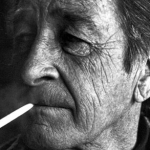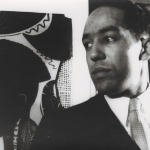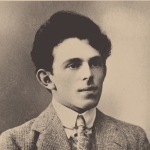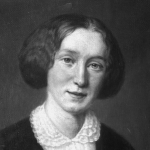1.
Betrayed by his five mechanic agents, falling
Captive to consciousness, he summons light
To all its duties, and assumes the world
Like a common penance. Rust on the green tongue burns
Like history’s corrosive on his living tree.
But all the monsters of his sleep’s dark sea
Are tame familiars in the morning sun.
2.
He sees the nation browse across burnt miles
Of toast, toward the time-clock. Deafened, hears
A Gettysburg of breakfast food explode
Against the surd tympanum of the air.
The roads outside to No-and-Any Where
Trigger all space-time to a zero Now.
The punctual goddess blossoms on his brow—
Pragmatic emblem of the daylit need.
3.
Now with his thought the rank and maundy world
(That lost between quanta and mechanic wave
All pulp and passion sprawls around the globe).
He stiffens, as a hand informs a glove,
And drags each lank potential into form.
Thus the hieratic arrow of his glance
Creates St. Sebastian Avenue Street Place—
All of sublunary circumstance
Crowds on the casual platform of his gaze.
4.
Like money sealed in a pneumatic tube
He whirls beneath the city’s stony floor
To where the cold coordinates of work
Advance their cross-hairs on the target hour.
There surplus value’s mathematic flower
(All X squared Y squared like a tesseract
Or ghostly dirigible) grows unseen
Across the lean dimension of in fact.
5.
Grows all unseen as Jason Quint pursues
The windy hazard of the Absolute
Through icy tundras, farther than the Horn,
Vaster than Asia in their wuthering snows.
The sweat of progress and humanity
Colors no litmus in those latitudes;
In a rustle of banknotes and casualty lists
The Bomb is shaken from the wrath-bearing tree.
6.
The quitting whistle lofts a flag of truce,
And all hope’s flutes and harpsichords compound
The lonely leisure. The Great Nocturnal Drift
Sets to its Deep. He walks the park. Profound
Unease returns to Quint. The sleepy lathes
Of hummingbirds machine the emerald
Of garden silence which his feet confuse.
The statues hoist, on labyrinthine paths,
The mineral grandeur of a public smile.
7.
And the world goes blank, and heavy as a stone
Rolls into night. It is the human hour.
Imperfect. Lovers, food and politics
Command the air, and Jason Quint alone,
Clothed in abstraction, like a bush that burns
In the blind frequencies where none may pass,
Stalks through that only country of the poor—
The lamplit hour the quitting whistle mourns.
8.
Imperfect. The stability of dextrous stars
Offers him comfort, but their light is cold.
A storm of sentiment, sudden as a cloud
Of migrant birds, sings in his head. Now stirs
The terrible friend, companion of his dreams,
With his emotional algebra of need and loss—
The hateful witness to his mortal part
And confirmation of his loneliness.




















Comment form: